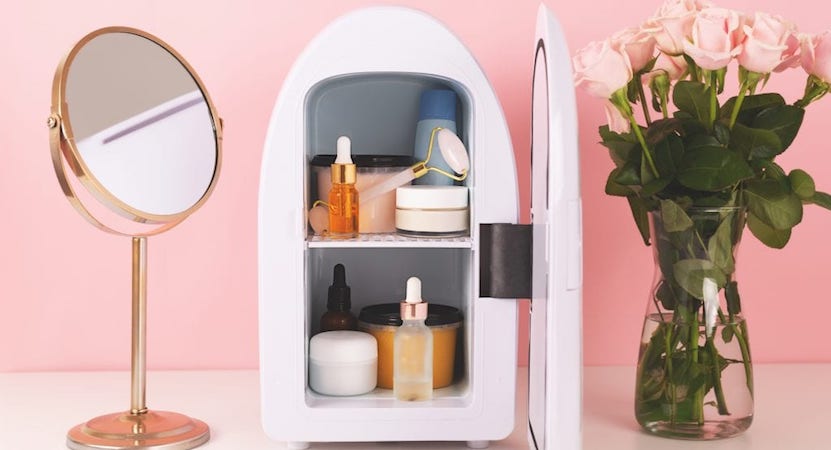To refrigerate, or not to refrigerate? That is the question. Are skincare fridges a necessity, or simply fad being pushed by manufacturers within the realm of beauty-based consumerism? We’ve gone deep in order to better understand these devices and how they may, or may not, benefit skincare product users. Read on for everything you need to know!
In this article we discuss the following:
- What is a Skincare Fridge?
- Should Skincare Products be Refrigerated?
- Why Natural Skincare Products Need to be Refrigerated
- Skincare Products that Should Not Be Refrigerated
- Benefits of Skincare Fridges
- Science Behind Skincare Fridges
- Skincare Products that Need Refrigeration
- Top 10 Skincare Fridges
- Caynel Mini Fridge Cooler and Warmer
- Cooluli Mini Fridge
- FaceTory Portable Beauty Fridge
- Vanity Planet Fria Skincare Fridge
- Nostalgia Retro Fridge
- Finishing Touch Flawless Beauty Mini Fridge
- Teami Mini Fridge for Skincare
- Uber Appliance UB-XL1 Personal Portable Mini Fridge
- Chefman Pink Travel Fridge with Car Charger
- Wayfair Ktaxon Countertop Mini Fridge
- DIY: How to Store Skincare Products in a Regular Fridge
What is a Skincare Fridge?
Storing skincare and beauty products in cool, dry places is not a new advancement in the world of self-care. It is widely known that beauty products contain formulas with delicate molecular compounds. While some of these formulas are preserved using chemicals, others are not. And keeping said products in temperature sensitive environments is the key to ensuring their longevity.
While your dark bathroom cupboard is usually suitable for makeup storage and skincare products, a trend of keeping these items in one’s refrigerator emerged decades ago. Dedicating a shelf in the fridge to all cosmetics became a common practice once the lasting results in doing so became evident.
In the same way photographers store film in the fridge, skincare lovers do so with the intention of keeping the products fresher for longer. To cater to such a demand, mini beauty fridges started to be manufactured by brands quick enough to spot the gap in the market.
Why walk all the way to your kitchen every morning when you can have a miniature beauty fridge right there in your bedroom or bathroom?
A skin care fridge, or cosmetic refrigerator, is a tiny, cheeky looking device that is smaller than most handbags. You may remember years back, when Coca Cola made a range of small refrigerators that could hold between 6 and twelve 12-ounce cans. It was all the rage to have a Coca Cola fridge in your bedroom; your cold drinks within reach at all times.
Brands such as Red Bull followed suit, and their transparent, branded miniature refrigerators can still be spotted filled with product, standing next to the DJ’s turntables at events that they sponsor.
A skincare refrigerator is no different, only they rarely go larger than the ability to fit six 12-ounce cans in size. This is usually adequate for the holding of serums, face creams and toners. Most skin fridges can fit snugly on a bookshelf, or tucked neatly in the corner of your vanity cabinet.
Should Skincare Products be Refrigerated?
The short answer to this question is both yes and no. In other words, it largely depends on the products and environments in question.
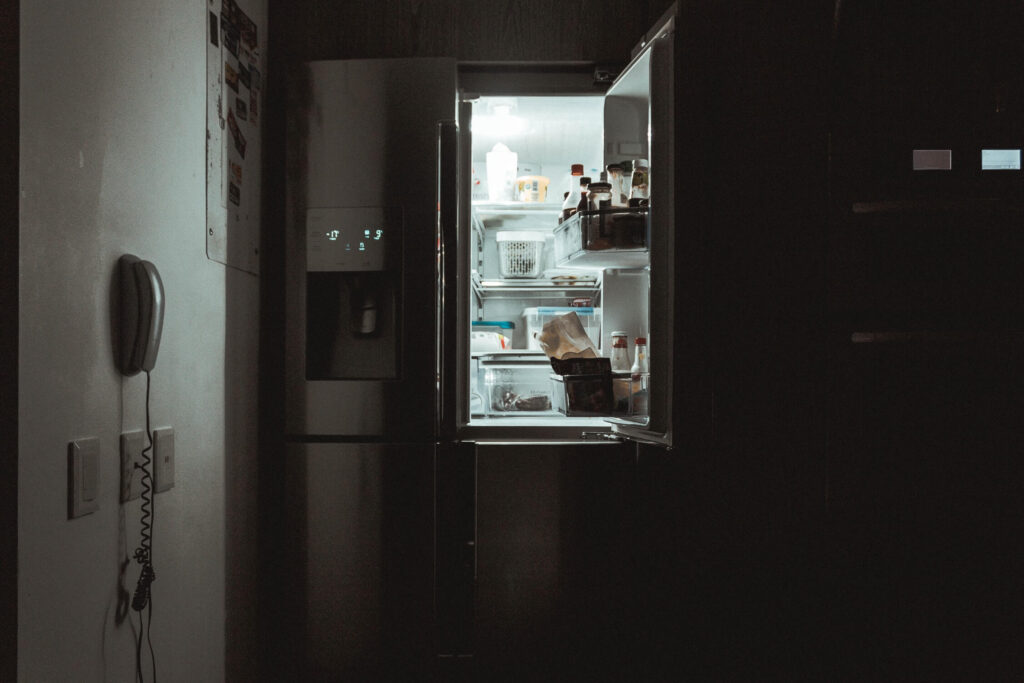
The main goal when it comes to storing skincare products in fridges is to extend the lifespan of the product in question. Just as we keep food cold in order to extend its freshness and edibility, so do we keep beauty products cold to extend their freshness and usability.
Experts maintain that skincare products should only be refrigerated if the fridge user is able to ensure that the device’s temperature never drops below 32ºF. Anything colder than this will cause many beauty products to freeze over; remember, face creams and toners are far less dense than regular foods.
There are little to no skincare brands that make products under the requirement that they be refrigerated once opened. There will be a few specialty products, usually with rare or active ingredients, that might come with a recommendation of refrigeration if possible — but these are not your everyday, drugstore purchases.
We spoke with Adina Mahalli, a hair and skincare expert, who said that “the theory behind a skincare fridge is that it works to keep your products cool and preserved. However, the truth is that any product on the market has had to undergo stability testing, meaning it won’t decompose at room temperature and will be usable for a significant amount of time. With this in mind, unless the product was sold in a refrigerator, there’s little reason to keep it one after opening.”
Desireé Delia, a Licensed Esthetician in NYC, adds “skincare fridges are fun, cute and a little luxury condo for our skincare products. Now, with that being said, the majority if not all of the skincare products (unless specified otherwise) out there are designed and made to be sustainable at room temperature. Does the fridge make the products work better? No. Does it feel nice to put chilled under eye cream on your eyes when you’ve had little sleep and your eyes are swollen? Yes. When it comes down to it, the skincare fridge is a choice not a requirement.”
Some people argue that while they understand they might not need to refrigerate their products, they often prefer to. There is reason to believe that using chilled beauty products can actually positively affect your skin.
There is a reason why some people make a point of holding frozen stainless steel spoons over their eye sockets every morning; the cold causes blood vessels to constrict and puffiness to be reduced.
Using cold skincare products has a similar effect on the skin that it comes into contact with. A firmer and tighter appearance is possible, especially if cold products are applied after a hot shower, when pores are wide open.
Objects used on the skin, such as jade rollers, can also be kept in the fridge (or freezer) so that it is cold in temperature upon use. Rolling chilled jade stone over your face first thing in the morning will help seal all applied products into the layers of the skin.
Likewise, if you’re someone who receives regular facials, peels or skin needling, you might find applying your products cold for a few days afterward helps to soothe the disrupted, inflamed skin.
Why Natural Skincare Products Need to be Refrigerated
It’s safe to say that the global movement toward more natural beauty products has definitely fueled the skincare refrigerator industry to some degree.
For years, researchers have been bringing the risks and side effects of certain chemicals to our attention. Ingredients such as parabens, silicone and types of alcohol are common in store-bought self-care products; all of which have ties to respiratory diseases, infertility, and even cancer.
So customers began demanding more natural formulas featuring ingredients derived from harmless botanicals with zero health risks. Natural face moisturizers, natural shampoos and natural lip gloss are but three examples of a broad spectrum of makeup and beauty products now being made toxin-free.
The thing is, when natural skincare products don’t use chemicals to keep them from rotting, then one has to turn to the external environment. In order to keep a body lotion from growing mold, for example, manufacturers would normally fill the formula with parabens that act as a preservative; killing off bacteria and preventing any new life from growing over time.
A plant based body lotion obviously says a hard “no!” to parabens, but that means the formula is at higher risk of bacterial growth and slow rot — it’s simply how nature progresses.
As we know, one of the most natural and effective ways of delaying a product from ‘going off’, is to simply control its external environment. Rotting is accelerated when the temperature of the environment is warm and damp; another reason why customers are always encouraged to store their skincare products somewhere cool and dry.
If you live in a significantly warmer climate, like on an island or near the equator, your bathroom cupboard likely won’t cut it when it comes to keeping your personal products at a sustainable temperature. An obvious compromise would be to keep them in the fridge!
A skincare mini fridge offers customers an easily accessible spot in which to keep their natural products from forming ecosystems of their own over time. Look at it as an investment that eventually pays for itself, and then some: your days of purchasing replacement products due to early expiration will become a thing of the past.
Skincare Products that Should Not Be Refrigerated
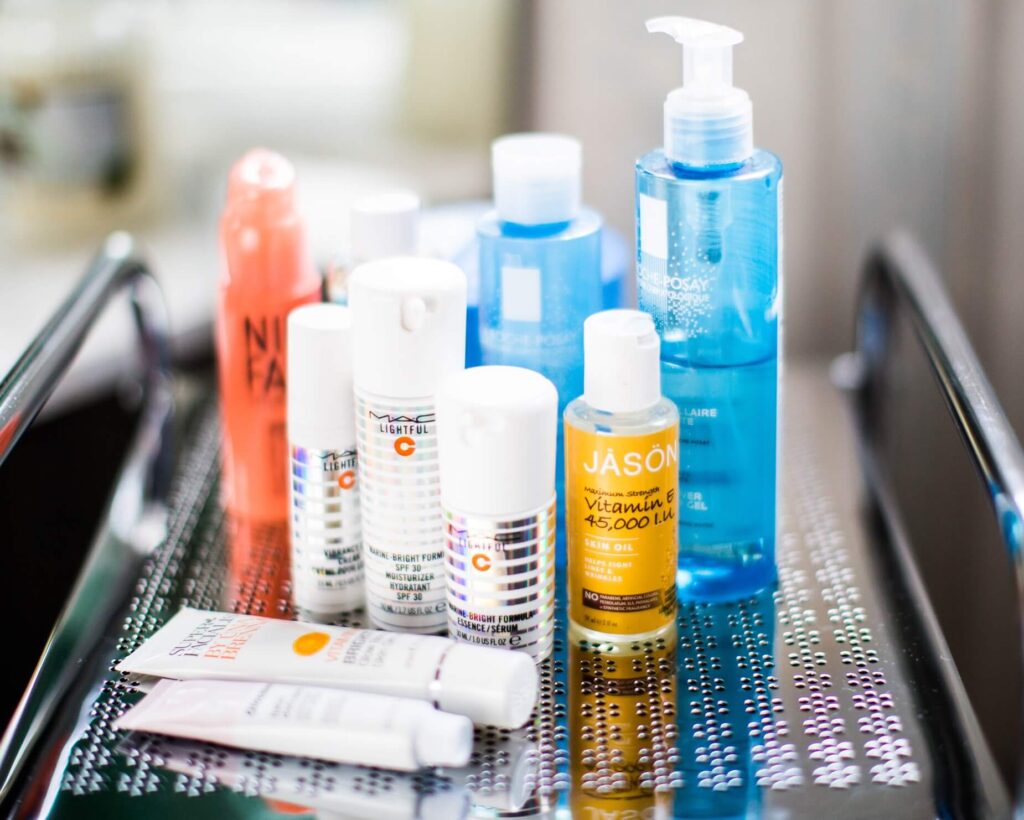
Make no mistake, there are an array of do’s and don’ts when it comes to using a beauty refrigerator. Should you neglect to do any prior research on what your products need in terms of ideal storage, you could end up spoiling some prematurely.
As mentioned, skincare products should never be held in a fridge that is lower than 32ºF in temperature. Anything less than this will cause even fridge-safe products to freeze over simply because they are so thin.
Ironically, natural beauty products are, by formula, the products that need refrigeration most. However they are also the products that can’t always take the heat… or cold, rather.
Oils
Any skincare or makeup product that is made using a carrier oil such as coconut oil, almond oil or grapeseed oil, is not suitable for refrigeration. Even at room temperature, coconut oil solidifies, which is not ideal when found in a product that needs to be easily spread, such as body lotion.
Even if the oil doesn’t solidify completely, like with almond oil, the coldness of the fridge might cause a noticeable change in texture in your product.
Clay
Clay is a common base ingredient for face masks and exfoliators. Found in both natural and chemical beauty products, clay can rarely handle consistently cold environments. Clay in the cold turns somewhat to stone, soaking up any trace of moisture in the process.
You’ll have to use a metal spoon or spatula to break through the substance once it solidifies like this in the fridge, and you may also need to rehydrate the formula by adding a liquid such as water, apple cider vinegar or honey.
Serums
Serums are hard to gage when it comes to refrigeration. It depends solely on the formula of the serum in question.
As a general rule, serums that are sensitive to heat and light are usually packaged in dark bottles or tinted glass, offering a layer of protection. These serums can usually always be stored in a fridge; Vitamin C and retinoids are included.
Serums in transparent packaging aren’t easily affected by light and heat, and perhaps even use it to their benefit to maintain their consistency. One should double check before putting these into a mini makeup fridge as it could affect that consistency that is relying on room temperature.
Unsealed Products
When using a fridge for skincare product storage it is imperative that all products have the ability to properly seal.
Fridges, particularly regular sized ones intended for food, harbor a plethora of food-derived bacterias whose sole intention is to multiply, multiply, multiply. Cross contamination between food and skincare products is possible — even common!
Of course, these bacterias can only do their thing if they can get inside of the product in question. A body lotion with a broken cap, for example, is not suitable for refrigeration. Take the time to fashion a new cap out of cling wrap, or transfer the lotion into a sealable jar, before placing it into a fridge. The same goes for any other skincare or makeup product.
Most of the time we can’t see when our makeup or skincare products have been infiltrated by food bacterias, but we see the effects physically when suddenly our usually gentle, effective face cream is giving us acne or rashes.
Benefits of Skincare Fridges
Well, ensuring the longevity of the skincare products in which you invest your hard earned money is an untenable benefit; especially since cosmetic fridges are such minor investments themselves. As we said earlier, they pay themselves off via the money they save you on replacing spoiled products.
Spoiled beauty products are not something to be taken lightly. It’s also important to acknowledge that a self-care product doesn’t need to display mold visible to the eye in order for it to qualify as “rotten”.
If you’ve ever done a spring clean of your personal belongings and uncovered products that have slightly hardened, or changed in scent, then you’ve encountered spoiled, rotten products. Beauty products don’t look like a moldy sandwich when they rot; they look like texture compromised formulas and often have questionable or potent aromas.

This is why so many people end up using spoiled skincare products even after the safety window has long gone; they simply don’t look as threatening as they are. In reality, the bacteria in the products is alive and well, and is very happy to move into a new habitat… your skin.
Irritation, acne and even nausea are symptoms associated with the use of skincare products that have not been preserved over time. The use of a skincare fridge can help reduce the risk of absorbing spoiled products, while offering the benefit of extended shelf life in the process.
Gabby Abascal, a Licensed Esthetician, says “skincare fridges are cute and fun! And if they get my clients to use their products more frequently then most definitely I do recommend them. Skincare fridges are not necessary but they are a good motivator for taking care of your skin. They’re like a new toy in your bathroom counter that you’re going to want to play with regularly.”
For individuals who reside in those warmer climates, makeup refrigerators give them the opportunity to use certain ingredients in their beauty regime that they usually may not be able to. Shea butter, for example, is one of the most nutrient dense natural moisturizers that we can use on the human body. However, if held in a vanity cabinet of a desert town, the butter melts into an undesirable oil.
Finally, there is something to be said about skin care fridges and the convenience that they bring to individuals who are already making use of their kitchen fridge to store their personal products.
We don’t know of anyone who enjoys having to trek between bathroom and kitchen every time they want to apply their self-care routine. For a lot of people, this occurs twice a day, and venturing back and forth is a logistical inconvenience. A skincare fridge keeps all of your products within reach while offering the same cooling benefits that your trusty kitchen unit was.
Science Behind Skincare Fridges
Skincare fridges weren’t just brought about to solve the problem of convenience; there is a targeted science behind them as well.
Regular household fridges sit at an average low of between 32ºF and 40ºF. These temperatures are just fine for most skincare products; any lower than 32ºF and most will start to freeze over. The trouble is that most household fridges experience what is known as frosting.
Frosting is that layer of ice that slowly forms across the back panel of the fridge walls. Anti-frost technology was introduced to the refrigerator market a few years ago, but most people own fridges that supersede this advancement and still experience the dreaded frost.
The frosting brings the inner temperature of the fridge down quite significantly. You might notice certain fruits and vegetables will even freeze over if they are situated too close to the back of the fridge. This is why defrosting your fridge/freezer ends up being a repeated event.
In these instances, storing skincare products in a regular fridge is no longer an option. The inside temperature will often drop below 32ºF, causing the products to freeze over in the process.
With miniature skincare fridges the science has allowed for the units to maintain an all-time low of 32ºF, never less. They offer anti-frost technology so that your temperature balance will not be compromised over time, and you’ll never have to spend a day scraping ice off of the back wall.
Because of their size, skincare fridges find it very easy to self-regulate. The cooling system is focusing on a very small, limited zone, as opposed to a full-sized fridge where the system has to fluctuate in order to move the cold from top to bottom.
This next point is left to speculation, but it is possible that manufacturers worked with refrigerator engineers to choose the perfect size for these compact units. As we noted earlier, skincare fridges are smaller than most handbags, and some actually feature a nifty carrier handle on the top panel. It is possible to use these devices as your primary means of transporting your skincare products whilst heading on a road trip or weekend away, as it would take up relatively the same amount of space to repack the products into a separate carrier bag.
Skincare Products that Need Refrigeration
Determining which skincare products need refrigeration, and which don’t, can feel like a daunting endeavor. Any skincare enthusiast will tell you that this initial overwhelm does subside once you become more familiar with the array of ingredients on offer and how they respond to cold versus hot — and then you’ll simply store your products accordingly.
These are the skincare products you are most likely to encounter than can greatly benefit from being refrigerated:
Natural Products
Any botanically derived beauty or makeup product needs a cool and dark environment in which to sustain its longevity. Ensure that said products are free of coconut oil and shea butter before storing in the fridge.
Essential Oils
There are a lot of skin care enthusiasts who swear by using essential oils on the face and body.
When it comes to essential oils, it’s not so much about warm versus cool as it is about temperature consistency. Essential oils see most of their decay in climates where temperatures change in extremes throughout the day: for example, cold mornings, sweltering afternoons, and chilly evenings.
By keeping essential oils in the fridge, the leaps in temperature changes are eliminated, and the oils can sit at a single temperature at all times. Citrus derived essential oils are the most easily oxidized of the lot, and this always happens as a result of temperature ups and downs.
Vitamin C
Any serum or skincare product that claims to be rich in Vitamin C should always be stored in the fridge. Like the citrus essential oils, Vitamin C oxidizes quite easily.
Keeping these products in the fridge reduces their exposure to oxygen, and therefore limiting just how much oxidation can take place.
Gels
Gels tend to lose their elasticity over time when stored at room temperature. By placing them into the fridge you are ensuring their extended shelf life, while also giving the product a one up when it comes to effectiveness. Everyone knows that chilled gels are more beneficial when applied to the skin!
Spray Sunscreen
Note that we said spray sunscreen, not all sunscreen.
Warmer environments actually weaken the SPF factors in sunblock. This is why you should never leave your sunscreen laying out on your beach towel or picnic blanket.
You can ensure the strength of the SPF by storing unopened or partially used sunscreens in the fridge, provided they have a spray function. Cream based sunscreens need to be kept at room temperature as they have a higher risk of solidifying on account of how thick they are already.
Perfumes
Few people realize that a mini makeup fridge comes in handy for one’s personal fragrances as well.
Most people keep their perfumes and fragrances out on a dresser, displayed where they can be seen and admired. The truth is, even at room temperature, perfumes are being broken down and their potency of scent greatly affected.
Storing your perfume in a refrigerator is said to increase the lifespan of a scent by up to three times.
Aloe Products
Aloe technically counts as a gel, but it is also a very natural plant derivative that is most beneficial when it is cooled.
Any skincare product that contains aloe as an active ingredient should be stored in a refrigerator; this includes aftersun products.
Top 10 Skincare Fridges
1. Caynel Mini Fridge Cooler and Warmer
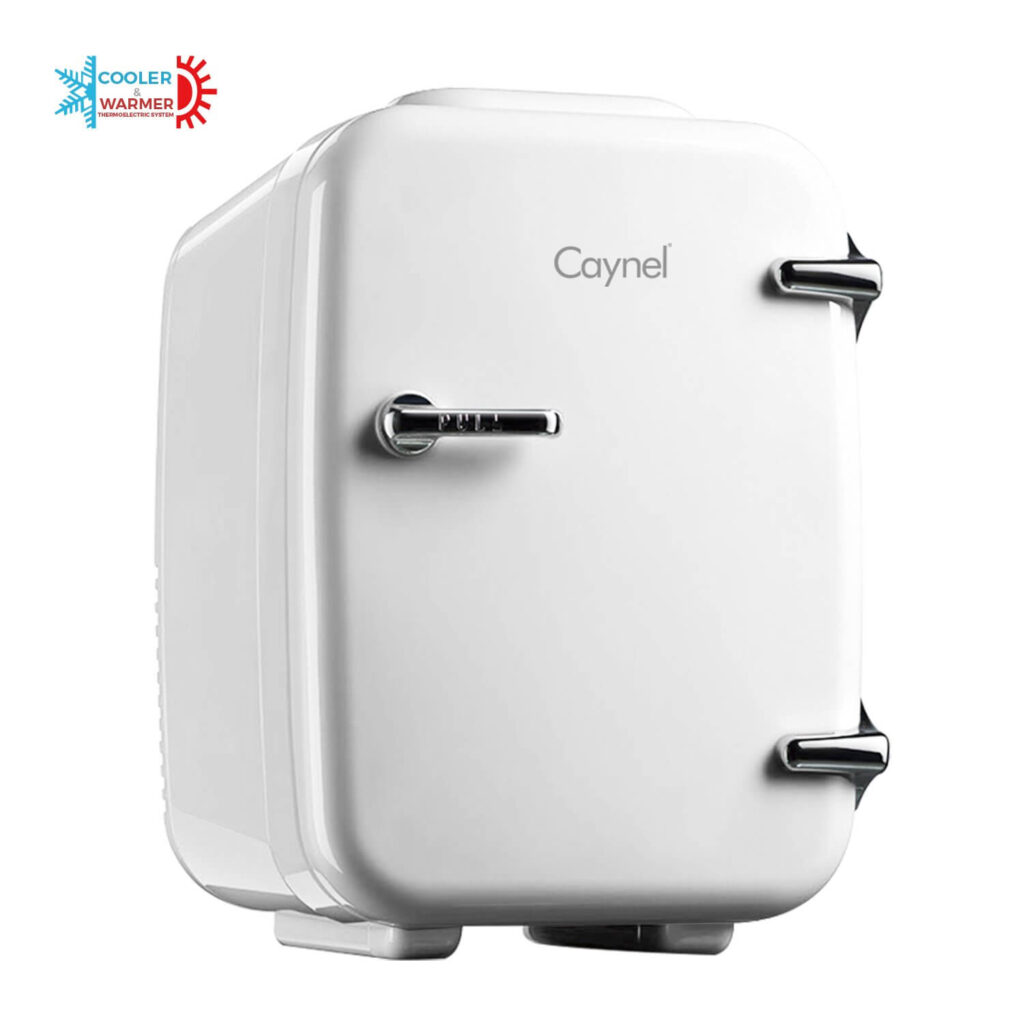
Take this attractive mini skincare fridge everywhere you go thanks to its nifty built-in handle. The retro design gives it that old school look, making it the perfect addition to just about any home space.
The 4 liter unit is ample space for your skincare needs, but the brand does offer bigger capacities if needed. There are four stylish colors to choose from!
2. Cooluli Mini Fridge
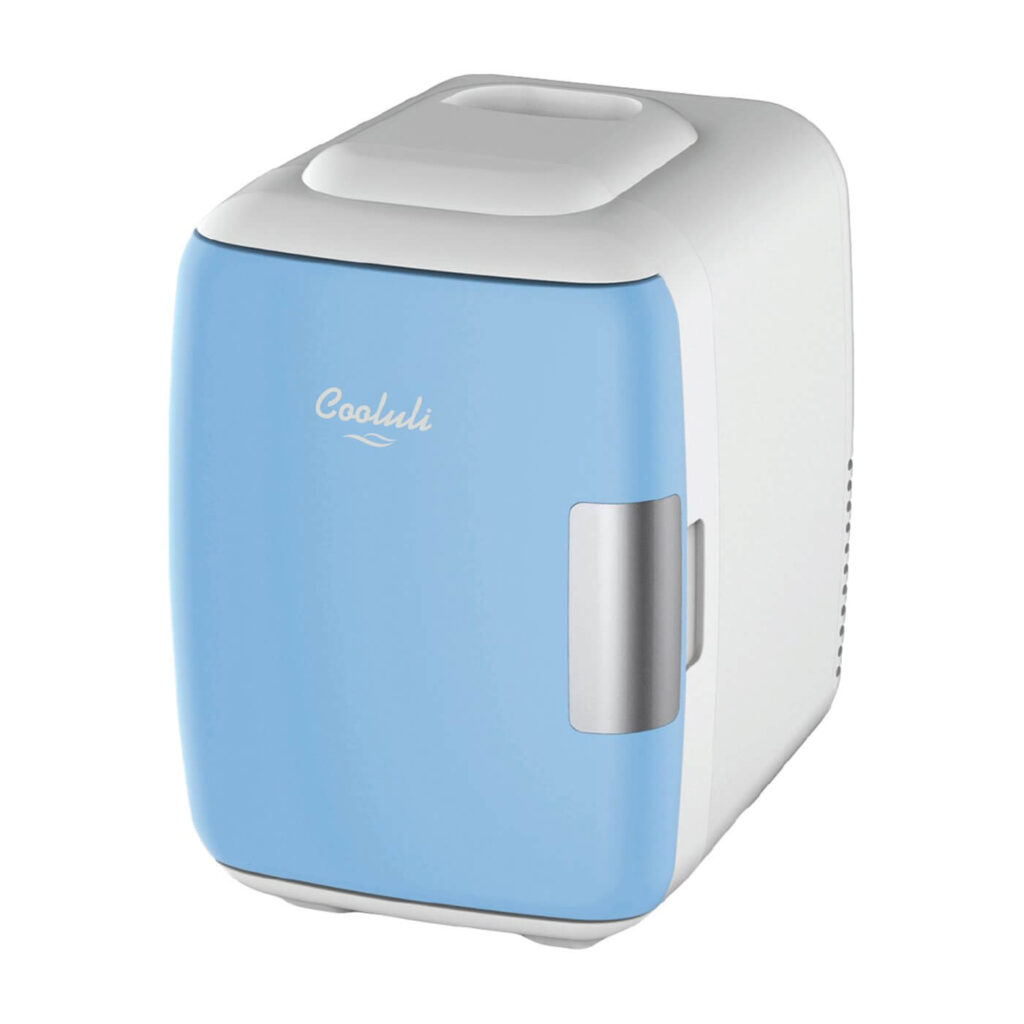
Cooluli are world leaders when it comes to making miniature fridges, so their 4 liter option is arguably the best beauty fridge around.
Remove the center shelf and you’ve got hoards of space for serums, lotions, face masks and more. They’ve included a convenient carrier handle in their latest model.
3. FaceTory Portable Beauty Fridge
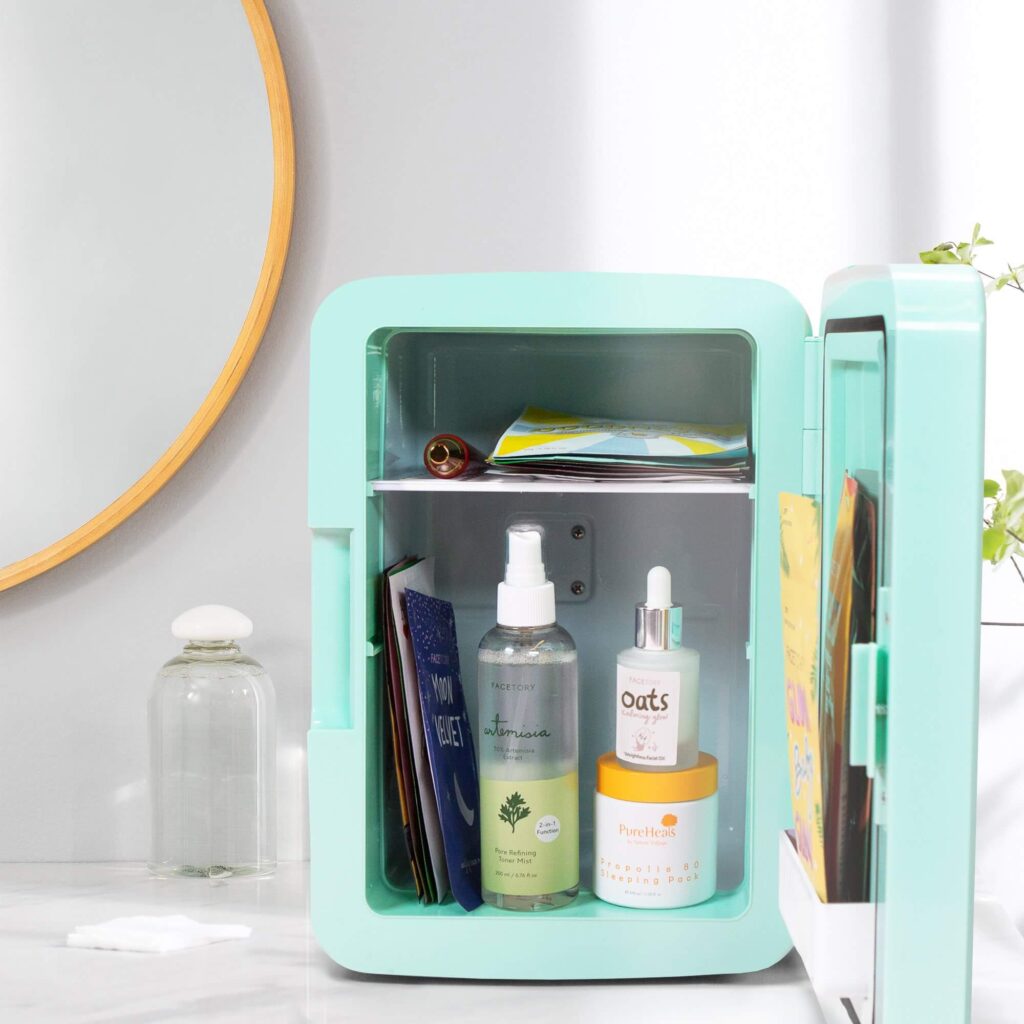
The FaceTory mini fridge was made with beauty in mind. The shelf on the inside of the door is perfectly shaped to hold up packaged face masks, while the inside shelving holds heights that correspond perfectly with most product sizes.
The skincare fridge comes in a striking coral pink or turquoise; an eye-catching addition to any vanity cabinet.
4. Vanity Planet Fria Skincare Fridge
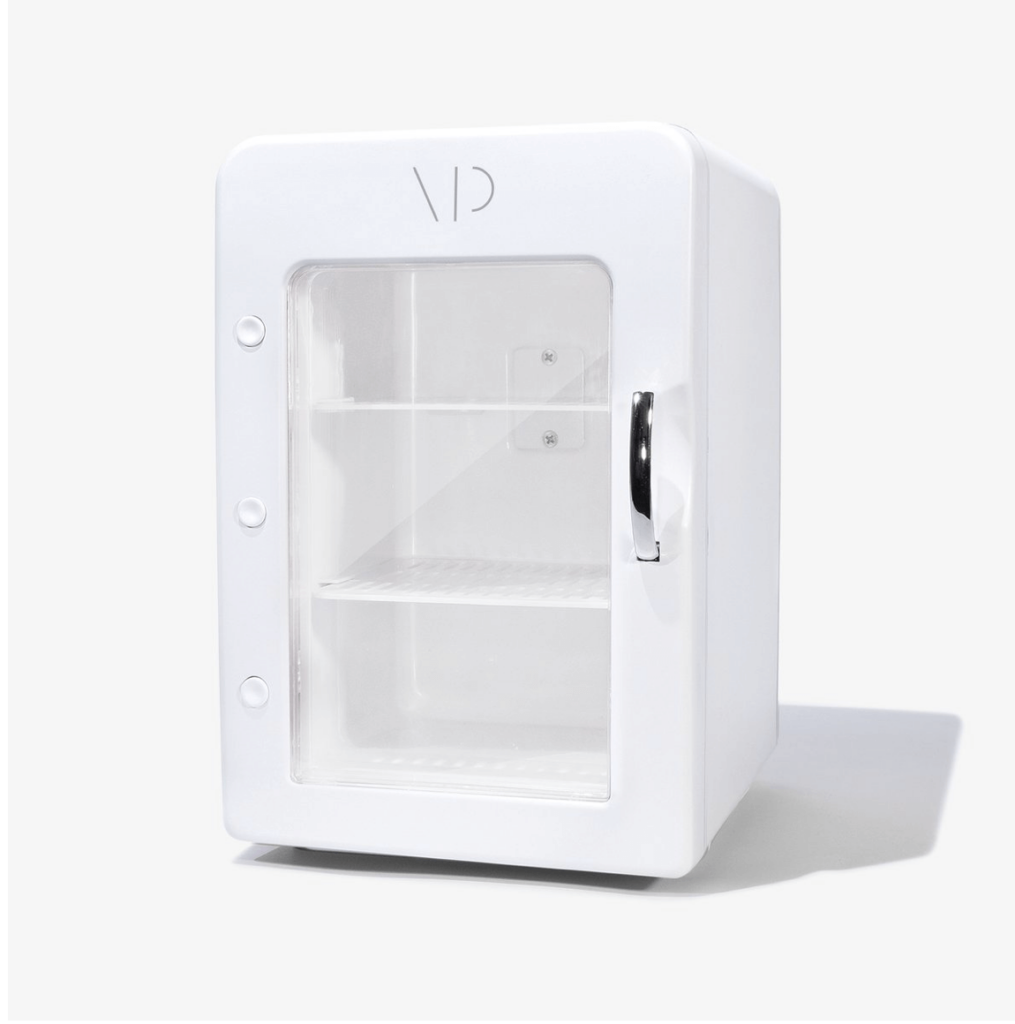
While the world of skincare has yet to be graced with the release of a glossier skincare fridge, the Fria unit by Vanity Planet is what one might imagine as a more than suitable alternative.
The Fria is designed so that you are in full view of your skincare products at all times. Your collection can be proudly on display even when not in use, while still reaping the benefits of a cold environment.
We love the white, but it comes in rose gold, too!
5. Nostalgia Retro Fridge
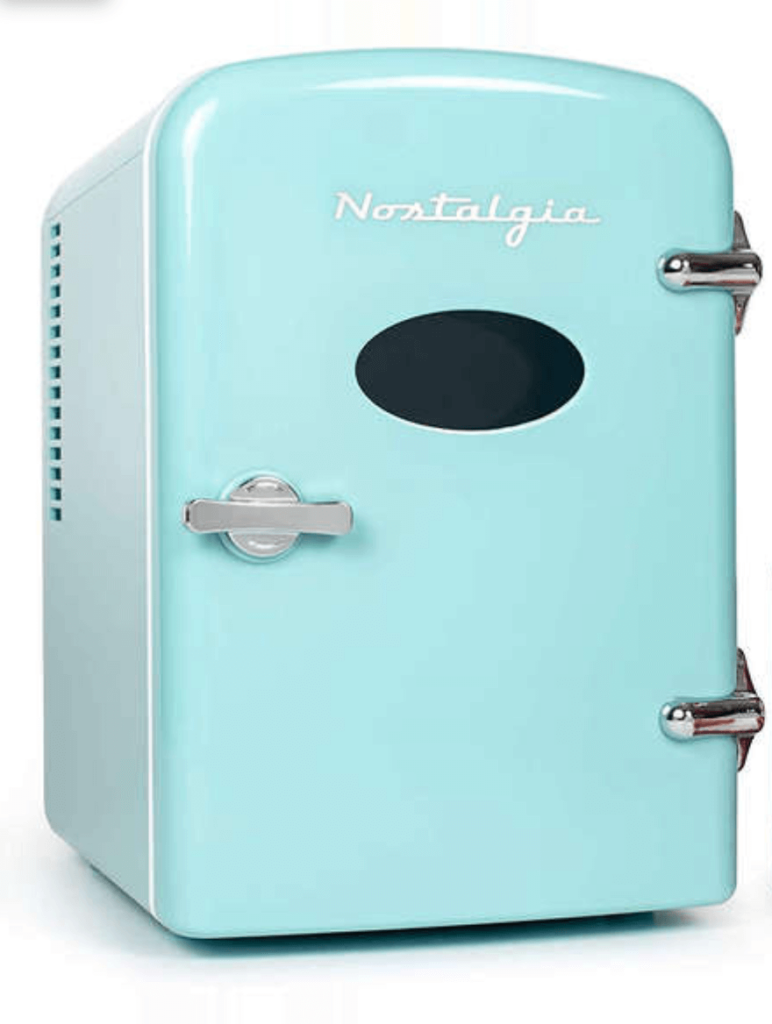
We love this unit by Nostalgia! They have aced the retro look and personality of this fridge.
It’s easily portable and designed to be taken wherever you go, when necessary. The unit comes with the necessary power chords to work when plugged into any 12-volt car outlets. Skincare while camping, anyone?
6. Finishing Touch Flawless Beauty Mini Fridge
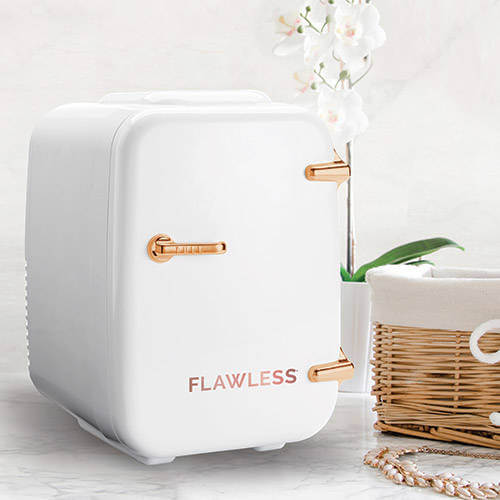
Flawless’ device is the best makeup mini fridge. If your skincare routine is more makeup oriented, then this is the cooling unit you’ll want to take a serious look at.
Not only does it look beautifully chic on any countertop, but the rose gold finish is something not found on any other beauty fridge on the market.
7. Teami Mini Fridge for Skincare
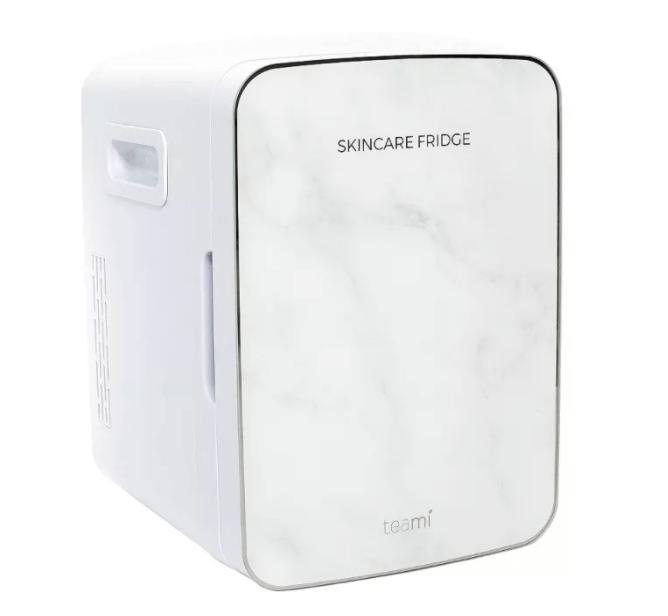
If you’re down to splurge a little bit, the Teami mini fridge is a symphony of performance and design.
This skincare fridge is finished with a marble facade, topped by a layer of protective glass. Inside, the fridge is full of room and users boast being able to store a beverage or two alongside their skincare products.
8. Uber Appliance UB-XL1 Personal Portable Mini Fridge
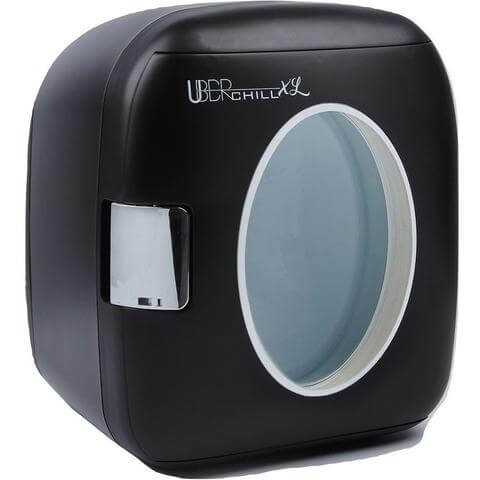
This skincare fridge comes in all black and makes an attractive addition to any modern home space. It wasn’t originally intended as a beauty fridge, but users have found great benefit in incorporating it into their bedroom or bathroom space for skincare use.
At present, Uber are only offering this fridge in black or silver and have discontinued their blue & white units.
9. Chefman Pink Travel Fridge with Car Charger
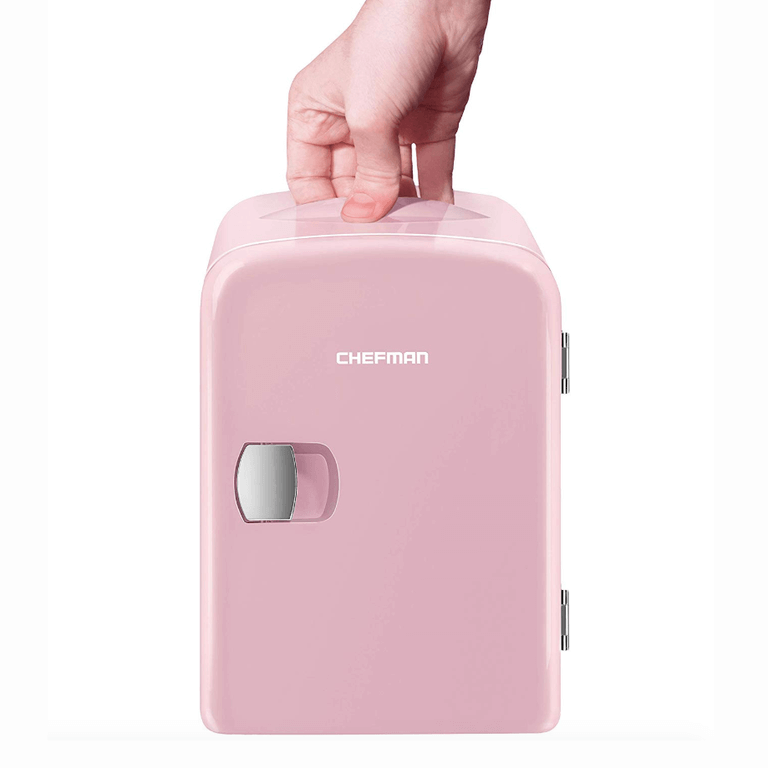
If you’re an avid road tripper or camping enthusiast, then the Chefman fridge is your best companion. The unit features a car charging port that makes it effortless to carry along on trips.
That being said, we would not recommend this unit for use in a bedroom. Bathroom use is fine, but the skincare fridge does have a noticeable hum to it that can be disturbing to one’s bedroom solace.
10. Wayfair Ktaxon Countertop Mini Fridge
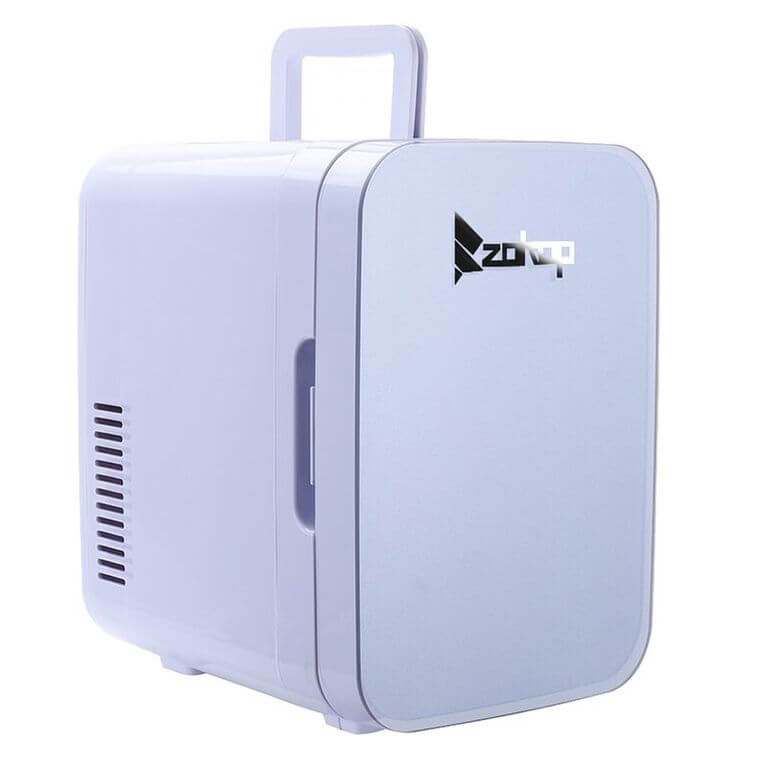
For an affordable and portable countertop skincare fridge, Wayfair has a great unit on offer.
Firstly, we love the lavender shade; to us, it screams beauty, beauty, beauty. Even though this is not a fridge targeted at skincare, the inside is spacious enough to hold all products safely.
The semiconductors used to make the Wayfair mini fridge are eco-friendly.
DIY: How to Store Skincare Products in a Regular Fridge
We get it — not everyone can afford to invest in a second fridge just to hold their skincare routine.
The truth is that a regular fridge works just fine, so long as you take the necessary precautions to keep cross contamination from occurring. The following are some great ways of doing so.
DIY: Dedicate a Compartment to Your Skincare Products
Most household fridges are made up of inner compartments and shelving. Dedicating a compartment, or shelf, to your range of skincare products is a great way of keeping them out of proximity to harmful food bacterias.
Some fridges boast a compact shelf in the door panel that is intended to hold cheese and dairy products. This shelf usually has a retractable plastic cover that keeps these products from interacting with the rest of the atmosphere going on inside of the fridge.
This can be a great place to store your skincare products as it is somewhat separated from the rest of the refrigerator.
DIY: Use a Plastic Container as a Fridge Insert
Just as you would store last night’s leftovers, so too can you store your range of skincare products. Invest in a sizable container with a sealable lid that can hold all of your fridge-destined products.
The container acts as a barrier between your products and the food bacterias floating around the inner environment. The products will be kept cold in the fridge without being compromised by cross contamination.
This is also great because you’ll no longer have to fish around the fridge for individual products. Instead, simply pull the entire container out, use what you need, and return it to its designated shelf.
Individuals with children who are likely to move things in the fridge around will also benefit greatly from having everything in their own container. Consider marking it “do not touch!”.
DIY: Decant Your Products
If you’re not confident in the seals of your skincare products, consider decanting them into sterile jars of suitable sizes.
Glass jars can be purchased in sizes suited from the smallest serums through to the largest body lotions. Storing food in jars is a process known for its ability to preserve and retain nutrients, while protecting from external bacterial threats — the same goes for your skincare products.
DIY: Adapt a Bar Fridge
If you’re not sold on having your face cream in the fridge alongside your fruits and veggies, consider adapting a different household fridge if you have access to one.
Bar fridges make great alternatives as they are usually used to store already sealed items such as canned drinks and syrups.
These are naturally less bacterially dense environments, and skincare products will experience little to no cross contamination while living inside of them.
The lowest shelf on the door of a bar fridge makes for the best spot in which to store skincare products. You want the products to be as far away from the built-in freezer as possible. Never let the freezer of your bar fridge become overgrown with frost whilst your skincare products are inside!
Did You Enjoy This Article?
If you enjoyed this article, you might also like our articles discussing beauty such as Top 10 Natural Perfume Brands, 16 Top Non-Toxic Nail Polish, and 13 Best Organic, Non-Toxic, and Natural Mascara.

